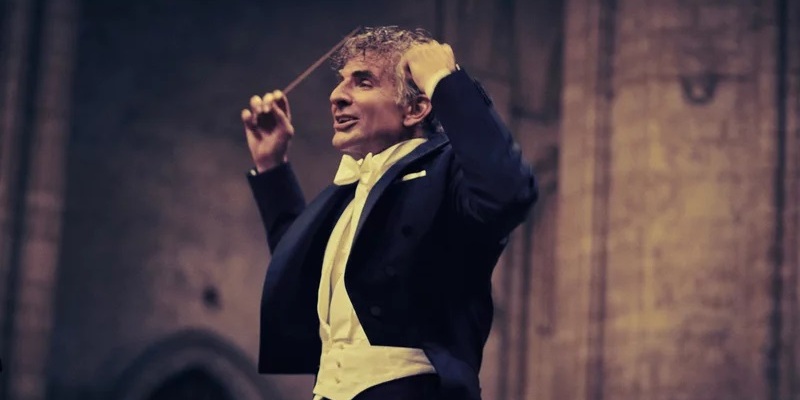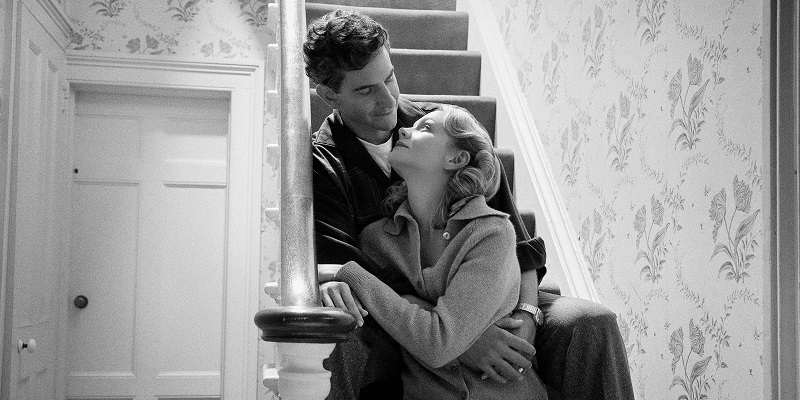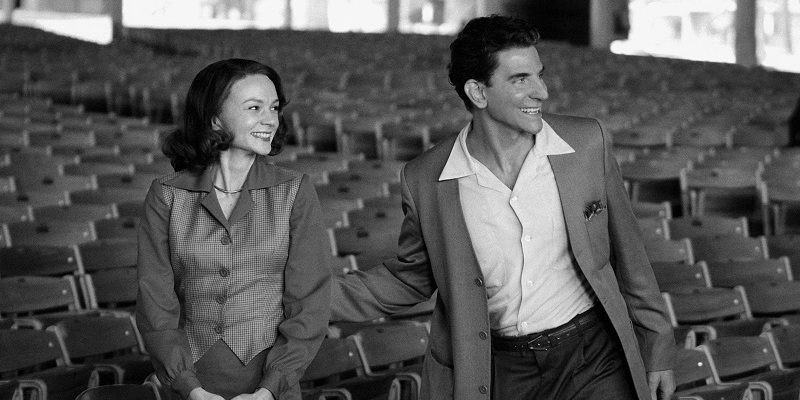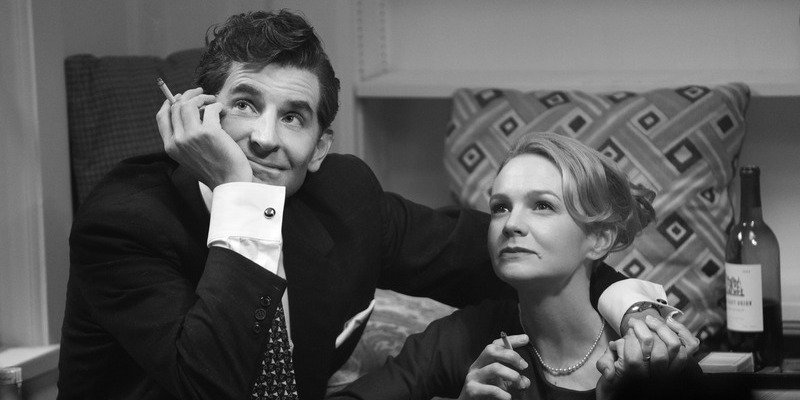
Review by
Eric Hillis
Directed by: Bradley Cooper
Starring: Bradley Cooper, Carey Mulligan, Matt Bomer, Maya Hawke, Sarah Silverman, Michael Urie, Gideon Glick

Bradley Cooper takes inspiration from his own
A Star is Born
for Maestro, his biopic of the iconic composer/conductor Leonard Bernstein. As with
his directorial debut, Cooper's second film sweeps us up in a whirlwind
romance between two creative people only to leave us wallowing in the
inevitable misery of their incompatibility.
Bernstein (played by Cooper in remarkable make-up that some have described
as "Jewface") is introduced as a young firebrand sweeping (and sleeping) his
way through Broadway in the 1930s, when America was beginning to shake off
its cultural inferiority complex and loudly trumpet its homegrown composers
(while wrestling with the uncomfortable fact that they were almost
exclusively African-American or Jewish). Riding a wave of artistic success
and wrapping himself in a cloak of adoration, Bernstein meets the
Costa-Rican actress and socialite Felicia Montealegre (Carey Mulligan). Bonding over their shared passion for performing, the two fall head over
heels. Trouble is, Bernstein is gay, or at least bisexual, and Felicia must
learn to live with this inconvenience.

Cooper and screenwriter Josh Singer haven't structured their film in a way that asks for sympathy for Bernstein's
having to live a secret life, but rather for Felicia in having to put up
with it. Perhaps it's a sign of recent progress that the film doesn't feel
it needs to side with a gay man over a straight woman, but it does feel like
Bernstein is being viewed through a modern lens, one that can't see the
forest of 20th century homophobia for the trees of modern acceptance. It's
difficult to watch scenes of Bernstein hitting on young men without thinking
of the predatory likes of Kevin Spacey, so the viewer is forced to remind
themselves that Bernstein is behaving in this manner because society has
turned his sexuality into something sordid and sleazy. Verbally, Bernstein
argues his case, but it's always clear the film isn't really on his
side.
Felicia is portrayed as the sort of victim who might be considered one-note
were she not played by an actress as good as Carey Mulligan. The
English star is very good at playing women who present a strong front but
whose eyes betray a tortured uncertainty. Even if we can't fully condemn
Bernstein, we certainly sympathise with Felicia, who likely thought she
could "cure" his homosexuality, as so many women would have at the
time.

The early stage of the couple's romance and Bernstein's ascent is presented
in black and white, and Cooper schools Damien Chazelle in how to channel the
expressionism of classic American musicals. As Bernstein woos Felicia with
his musical talent, even inserting himself into the tight sailor outfit of
his Broadway hit On the Town, we tap our toes and click our fingers in time
with the beating of her swollen heart, and we're left in no doubt as to why
she would find this man so seductive.
Cooper switches to colour for the movie's second half as things fall apart
for Bernstein and Felicia. It's the colour of 1970s magazines, of
sweat-stained shag carpets and nicotine polished fingers. Much like Bob
Fosse's Lenny, Cooper's camera, which had previously been in Bernstein's youthful face,
views events at a remove, one of the film's highlights being a Thanksgiving
day row that positions Cooper and Mulligan at such extreme ends of the frame
it becomes increasingly uncomfortable the longer we contemplate the negative
space between the actors.

As a story of one performer who discovers they can't live in the shadow of
a fellow artist who burns too brightly, Maestro is a better
version of A Star is Born than Cooper's actual take on that
oft-told tale. As a biopic of a creative force it's somewhat lacking
however, and we learn practically nothing about Bernstein's relationship
with music. Cooper claims to have spent six years learning to conduct a
piece of music for a bravura six-minute sequence. Conversely, Jimmy Stewart
had mere weeks to prepare to play the protagonist
The Glenn Miller Story, yet Anthony Mann's film is one of the all-time great movies about what
it's like to be in love with music. Despite having made two movies about
music, I don't get the sense that Cooper has much interest in that
particular art form, but he sure knows how to get an audience swept up in a
doomed romance.


